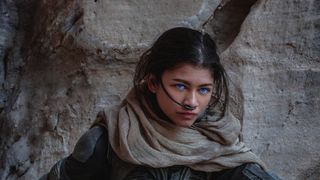
Warning: Spoilers follow for Dune
As you’ll likely have heard by now, Denis Villeneuve’s Dune comes to a rather abrupt end.
It was always known that the director would shoot his thunderous adaptation of Frank Herbert’s sci-fi novel in two parts. But seeing this lack of finality – and arguably, drama – play out in the duology’s introductory instalment might come off as disappointing, especially to those who had looked forward to Dune with inevitably ill-fated levels of expectation.
By the same token, though, there is no other way I would rather have seen Villeneuve tell this tale. To those unfamiliar with the source material, which the director so meticulously adheres to throughout the film's 150-minute runtime, Dune is an intimidatingly dense story of familial upheaval, political tension and theological prophecy. In practical terms, that means it's a 20-hour audiobook, or a novel you probably wouldn’t get around to finishing on a week-long holiday.
- Check out our spoiler-free review of Dune
- Denis Villeneuve on bringing Frank Herbert’s sci-fi epic to life
- This is how to watch Dune online
As such, Villeneuve only agreed to dramatize his version of Dune if he was permitted to do so across two films – with the first laying the groundwork for a more comprehensible, exciting second. By necessity, then, Dune: Part One occasionally suffers under the weight of its expository responsibility.
But Villeneuve knows this. He loves this material like a Bible, and does exceptionally well to delve into Herbert’s complex lore and religious ramblings in a way that never seems inaccessible. Soundtrack and sandworms aside, Dune is far from standard blockbuster fare, and though its lack of dramatic tension means it isn’t the standalone sci-fi spectacular many expected it to be, the director uses a particular plot device to hint that Dune: Part 2 will deliver on that promise – Paul’s dreams.

Villeneuve not only employs his protagonist’s (perhaps overly frequent) visions as a narrative tool throughout the film – proof of Paul’s role as the messianic "Muad'Dib" – but also as a means of teasing Dune’s sequel. He dangles the most exciting parts of Herbert's novel in front of his audience while acknowledging that he’s not yet able to showcase these sequences this early in the story.
Get daily insight, inspiration and deals in your inbox
Get the hottest deals available in your inbox plus news, reviews, opinion, analysis and more from the TechRadar team.
In such moments, Villeneuve is basically saying, “Look, guys, this is the movie you thought you were about to see, but come back in two years and you’ll get it.”
And you know what? That’s actually okay. Sure, it was frustrating to discover that certain dramatic set-pieces teased in the trailers (the giant desert battle, for instance) remain teases (read: visions) in the film itself, but at least they're evidence that Villeneuve’s hyper-faithful adaptation will crank up the action in an as-yet-uncommissioned follow-up.
Paul’s dreams are my dreams for what Villeneuve’s Dune would turn out to be when he attached himself to the project back in 2016. And since they prophesize the events of its sequel, almost as if the director has already shot it, I am more than happy to stomach the abrupt half time whistle and look forward to Dune: Part 2 with anticipation equal to the first.


It’s difficult to know whether the effect of these cinematic breadcrumbs is the same to those unfamiliar with the rest of the novel’s story. I watched the movie with friends who were (and still are) entirely unaware of how Dune plays out in its entirety, so it’s no surprise that some felt cheated by Villeneuve’s unapologetic halting of proceedings.
Perhaps if Dune was more obviously marketed as Part 1 of a two-part story, those cinemagoers who hadn’t immersed themselves in its press tour prior to viewing might not feel so short-changed by its lack of finality.
But Jason Momoa’s Duncan Idaho offers a telling epigram for the director’s hopes of a sequel early on in the movie. His line “dreams make good stories” is intended to ease Paul’s mind, though it also rather sums up Villeneuve’s approach to hooking his audience on an even better film he can’t yet make.
It’s Zendaya’s Chani, however, who gets the most unmistakably direct (and very last) piece of dialogue in Dune’s two-and-a-half-hour runtime. “This is only the beginning,” she tells us – which is absolutely true of this sprawling story, and hopefully Villeneuve’s stewardship of it.
Dune is now streaming on HBO Max in the US
- Check out the best movies on HBO Max

Axel is TechRadar's UK-based Phones Editor, reporting on everything from the latest Apple developments to newest AI breakthroughs as part of the site's Mobile Computing vertical. Having previously written for publications including Esquire and FourFourTwo, Axel is well-versed in the applications of technology beyond the desktop, and his coverage extends from general reporting and analysis to in-depth interviews and opinion. Axel studied for a degree in English Literature at the University of Warwick before joining TechRadar in 2020, where he then earned an NCTJ qualification as part of the company’s inaugural digital training scheme.
Most Popular


